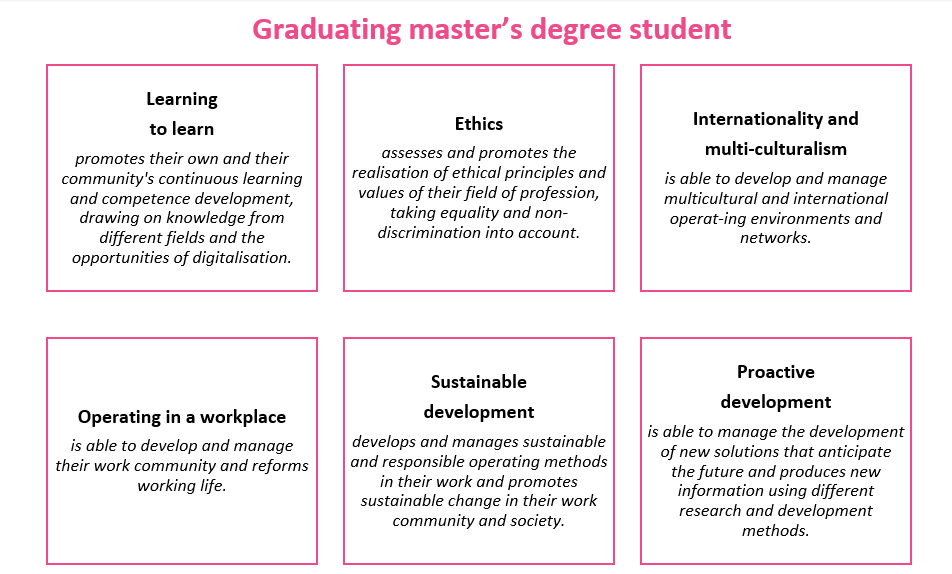
Savonia Article: Master’s Competencies: Supportive Tools or Obstacles in Studies?
This work is licensed under CC BY-SA 4.0
The goal of Master’s level (in Finnish ylempi ammattikorkeakoulututkinto, YAMK) education is to strengthen students’ competence so that they meet the nationally agreed-upon competency requirements for competencies (see Figure 1). Competency refers to expertise or eligibility. According to Arene (2022), recommendations have been developed for common competencies that Master’s level graduates should achieve through their Master’s degrees or Master’s level competence modules.

At Savonia University of Applied Sciences, the Master School Team has embarked on a determined quality improvement effort, focusing on examining the quality of teaching and the fulfillment of competencies, particularly in multidisciplinary elective Master’s level studies.
Observations Regarding Competency Fulfillment
During our internal review, we observed that certain competencies, such as sustainable development, internationalization and multiculturalism, still require strengthening within Master’s education. In practical terms, this means that these competencies should be more broadly considered in course objectives, implementation plans, and execution. For instance, incorporating relevant learning materials and assignments can enhance the development of these competencies. It’s important to note that not all competencies need to be fulfilled in every course; what matters is that graduating students have achieved them during their studies.
Academic Skills and Source Citations
In addition to competency requirements, mastering academic skills related to research information retrieval, critical evaluation of information, and proper source citations is crucial. Occasionally, students question the necessity of international research and publications in their studies, and the importance of proper source citations may not always be fully understood. By defining competencies, we can justify the level of requirements in education.
Internationalization as a Challenge?
The requirements for scientific writing are based on the level seven (7) competency requirements of the Master’s degree. This means that, for example, the use of research-based knowledge and the justification of information are one central part of the studies. The same competencies also underlie, among other things, the use of international source material as part of the studies. Learning tasks and the thesis are contextualized with national and international research knowledge. In this context, source criticism must also be taken into account. We have a very diverse range of source materials, so based on source criticism, the student must choose the highest quality research information and learning material suitable for the field.
According to Arene (2022), Master graduates should:
• Possess comprehensive and specialized expertise relevant to their field, including concepts, methods, and knowledge used as the foundation for independent thinking and/or research.
• Understand questions related to information at the interfaces of their own and other fields and critically examine new information.
• Work independently in demanding expert roles within their field and engage in international collaboration or entrepreneurial activities.
One of the competencies also emphasizes that graduating students should be able to “develop and lead multicultural and international operational environments and networks.” This is realized, for example, by the student “communicating and engaging in interactions in a second domestic language and being capable of demanding international communication and interaction within their field using at least one foreign language.” (Arene 2022).
Therefore, at a minimum, we encourage every student at Savonia Master School to familiarize themselves with English-language source materials and utilize them during their studies. International collaboration and strengthening cultural knowledge require that English-language materials are included as part of the course content.
In addition, we encourage every student to strengthen their expertise in this field because workplaces are becoming more international. It must be acknowledged that enhancing one’s skills can be challenging if international student exchange programs are not included in the studies. However, reinforcing international competence is essential.
From competencies to quality
International collaboration and strengthening cultural knowledge require that English language becomes part of our course content in the future. In our courses, we encourage every student to enhance their expertise in this field. Workplace communities are becoming more international.
The common Master level competencies guide our actions. Their purpose is not to hinder or impede learning but to ensure and enhance the quality of education. Through this, we can increase graduating students’ readiness for the job market.
This article has been published in Finnish in April 2024 https://www.savonia.fi/artikkelit/yamk-kompetenssit-opintojen-apuna-vai-kompastuskivina/
Writers:
Elisa Snicker, MSc (Econ and Bus Admin), MSc (Health Sci.), Lecturer, Savonia University of Applied Sciences, Unit of Continuous Learning, Master School, Member of Quality Group of Master School
Minna Hoffrén, PhD, Lecturer, Savonia University of Applied Sciences, Unit of Continuous Learning, Master School, Member of Quality Group of Master School
Pirjo Turunen, Licentiate in Social Sciences, Principal Lecturer, Savonia University of Applied Sciences, Unit of Continuous Learning, Master School, Member of Quality Group of Master School
Ulla Pekkarinen, MSc, Lecturer, Savonia University of Applied Sciences, Unit of Continuous Learning, Master School, Member of Quality Group of Master School
Liisa Klemola, PhD, Lecturer, Savonia University of Applied Sciences, Unit of Continuous Learning, Master School, Organiser of Quality Group of Master School
Reference
Arene 2022. Recommendation on the shared competences of universities of applied sciences and their application 2022. https://www.arene.fi/wp-content/uploads/Raportit/2022/Kompetenssit/RECOMMENDATION%20ON%20THE%20SHARED%20COMPETENCES%20OF%20UNIVERSITIES%20OF%20APPLIED%20SCIENCES%20AND%20THEIR%20APPLICATION.pdf?_t=1642539550. Read 8.5.2024.